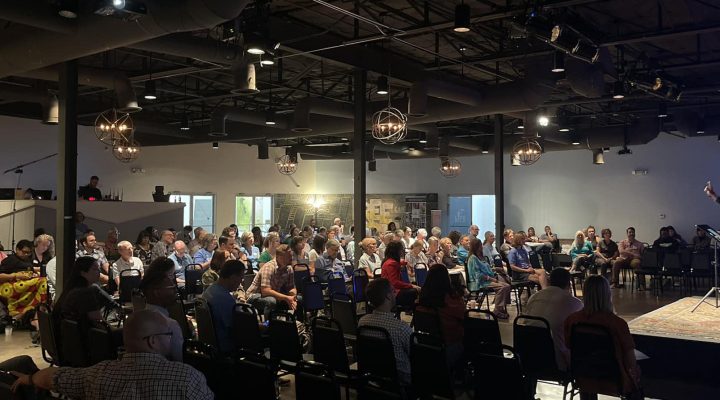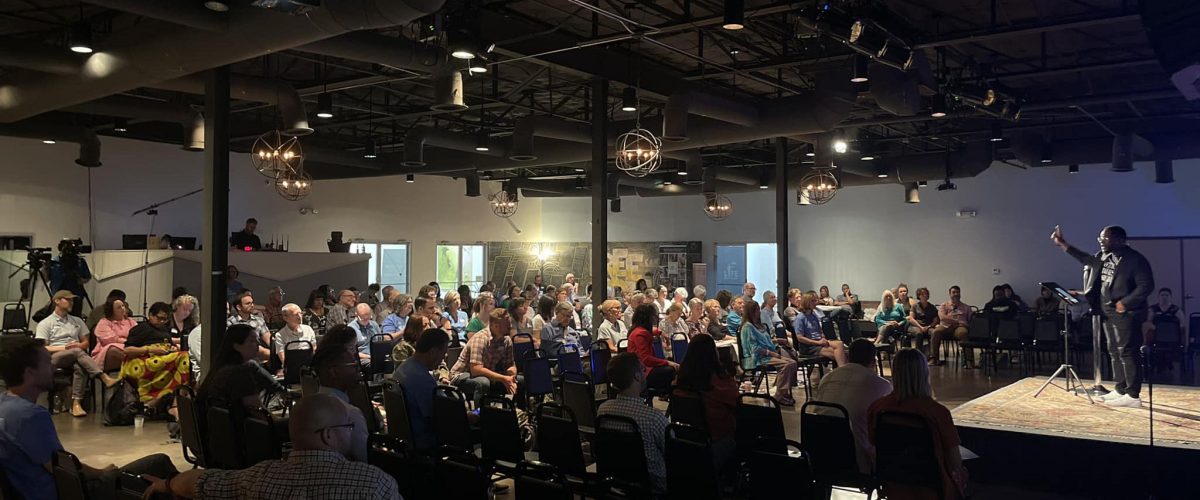Identifying needs and strategies for advocacy and action was the focus of Fellowship Southwest’s first Compassion and Justice Conference in Dallas last week.
Convened at Life in Deep Ellum, a church and community center on the eastern fringe of downtown Dallas, the conference brought together several hundred people to hear speakers and attend workshops focusing on immigration, hunger, racial justice and indigenous topics.
Healing a broken immigration system
Alexia Salvatierra, academic dean of Centro Latino at Fuller Theological Seminary and associate professor of mission and global transformation, said her topic — “Healing a Broken Immigration System” — might be about “fixing” or “repairing” the system, but she chose the word “broken” because the system is “breaking” people.
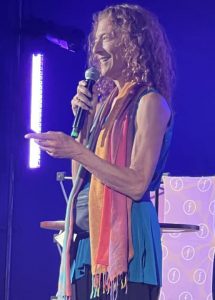
Alexia Salvatierra speaking at the conference. (Photo by Starlette Thomas/Good Faith Media via Facebook)
“Individuals, families, churches, communities and people who are broken need to be healed,” she said. “But how do you heal a broken system? We have to face (the fact) that this system is complicated — that it makes the DMV and the IRS look simple and sane in comparison. But we can understand it well enough to respond to God’s call.”
Salvatierra said one of the problems in answering that call is that most Christians take their opinions and perspectives on immigration from their political perspectives. She pointed to a study conducted by Lifeway Research a few years ago indicating 17% of evangelicals get their opinions on immigration from Scripture, with the majority getting it from their political affiliations.
“And brothers and sisters, that’s not OK, right? As Christians we have to be people for whom the word is our authority,” she said. “So what does the word have to say? Well, one of the problems we face is that we bring our political perspectives to the study of the word. We try not to, but we do.”
The result, she said, is people break into camps focusing on all the different Scriptures that call Christians to hospitality, whether that be opening doors to strangers or putting respect for the law first. She said her own experience has led her to focus on Matthew 9:35-36, where Jesus first looks at the crowds, and he has compassion.
“Jesus looks at us and he feels our pain as if it was his pain. That’s what moves him on a human level to do what he did,” she said. “How many of us have received the compassion of Jesus? If we received it, we have to give it. But you know, Jesus does something in the Scripture before he has compassion: He sees. He looks deep into the hearts of people, deep into the lives of people, and he sees what is hurting them.”
Salvatierra said the church does not have a compassion problem, but it does have a vision problem.
“We don’t see even what’s going on with people in the pews, let alone what’s going on in the community,” she said. “To have the compassion of Christ coming through us, and not to have compassion fatigue, we have to see through the eyes of Christ.”
She went on to say Jesus didn’t just look at individuals; he looked at crowds too.
The church does not have a compassion problem, but it does have a vision problem.
“If you see one little girl struggling in school and you have compassion for her, what do you do? You tutor her, right?” she said. “But what if you see 300 children struggling in the same school? You begin to say, ‘What is wrong with that school? Do they not have teachers that are trained? Do they not have books?’ You see the problem and solution differently if you not only see individuals, but you also see the crowds. That’s what gets you not only to compassion, but also justice.”
Salvatierra said most people in the United States, regardless of their political leanings, know the nation’s immigration system is ineffective.
“We know it doesn’t work, plain and simple. If you get a step closer, you know it’s illogical. And then a step closer, you know it’s unjust and inhumane,” she said.
She described how before 1965, the U.S. immigration system was based on quotas from different countries, but there was no quota for the North American continent, which meant there basically was no southern border. That doesn’t mean there wasn’t discrimination, and in fact during the 1930s, 500,000 Mexican Americans were deported and 80% of them were U.S. citizens.
Then beginning in 1965, the policy became that there were preferences for who could come into the country, which she described as: blood (family), sweat (an American employer petitions for you) and tears (refugees and asylum seekers). She said there also are some smaller categories under tears such as domestic violence and trafficking. There also are temporary visas for students, tourists and guest workers.
“These preferences don’t really allow anybody to come who doesn’t fit into the preferences. You cannot come to this country because you have a dream, legally,” she said.
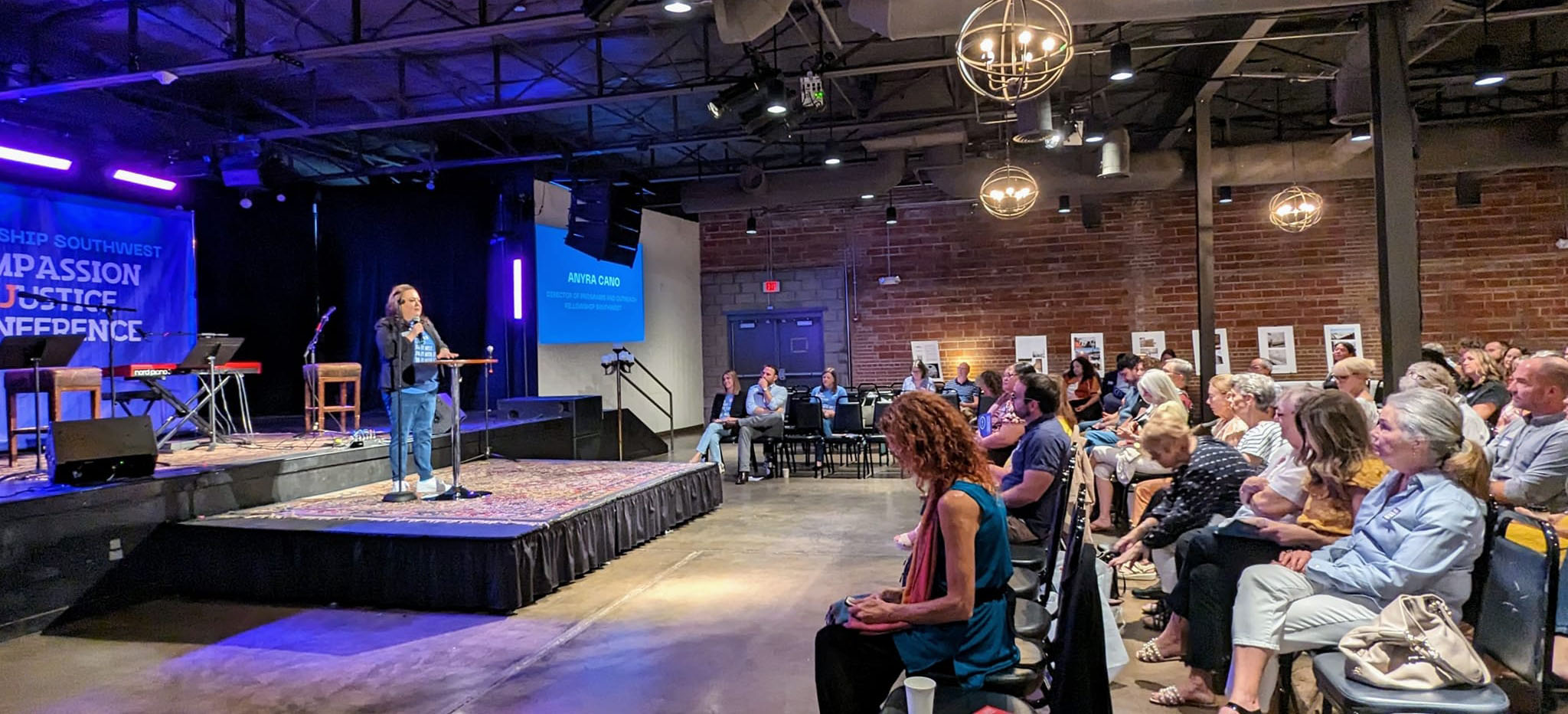
Anyra Cano speaking at the conference. (Photo by Starlette Thomas/Good Faith Media via Facebook)
Gifts for immigrants
Salvatierra said the “gifts” Christians can offer in response to this situation include “accompanying” immigrants as Jesus accompanies us. That includes providing affordable, high quality legal support as a counter measure to the tiburons — the sharks — who promise them “papers” in exchange for $5,000 and then leave them with nothing.
“There are a number of pastoral and psychological needs that people have,” she added. “We know a lot about that, and most churches I know are learning more about it. It is a critically important way of accompanying. People need housing, they need care, they need a bunch of very practical things we can provide that are acts of mercy. But people need more than that, they need advocacy.”
As well, immigrants need help beyond individual advocacy that can come from the powerful voice of the church. Salvatierra said most people don’t know that in both 2007 and in 2013 there were bipartisan legislative proposals that would have reformed the whole immigration system and would have made it much more effective, logical, just and humane.
Most people don’t know that in both 2007 and in 2013 there were bipartisan legislative proposals that would have reformed the whole immigration system and would have made it much more effective, logical, just and humane.
“The second proposal in particular was the best immigration legislation I’ve seen in my life,” she said. “It was written by the Gang of Eight. It wasn’t perfect. It was a compromise. It was good.”
When polled on that legislation, support was 75%, but it didn’t pass because the people who supported it didn’t care about it. The attitude was, “Yeah, I’d like a good immigration system, but it doesn’t affect me. It doesn’t affect my family. I’m not going to bat for it,” she said.
“So the average person has no passion on the issue, and the people who do have passion don’t have any hope,” she said. “But what is the one institution in our society that is mandated to care passionately about people who are not us? This is a Sunday school question; you know the answer to this question. What is the one institution that is commanded to give people hope in hopeless situations? The church.
“And the church has in it people who lack passion and people who lack hope, who are brothers and sisters in Christ, who are one body,” she continued. “If we have intimate relationships with each other, we get the exchange of passion and hope — where people who have no passion get passion because we know brothers and sisters who are desperate, and people of no hope get hope because we have people with more power, who are with us.”
Salvatierra said she believes one of God’s purposes in all of this is to create more unity in the church. “We need a much deeper and broader base, a much deeper spiritual cleansing. And so that’s what we have to work on to move this forward.”
Later in a workshop on immigration, experts working in the field urged churches and individuals to join them in the work.
Alma Ruth, founder and director of the Practice Mercy Foundation, which works with women and children along the Texas-Mexico border, said it’s important to acknowledge that while immigration is a spiritual issue, it also must be an incarnational issue. “Please come,” she said.
Rosalio Sosa, pastor of Tierra De Oreo in El Paso, echoed that sentiment: “Be present with us. Don’t be afraid to visit. We have security.”
John Garland, pastor of San Antonio Mennonite Church, said the work requires operational discipline. Just as the disciples in Mark 8 worried they didn’t have enough food to feed the masses, “we all feel we’re not enough.” That is an attitude they confront at his church as they prepare to serve those in need, he said.
“Every Friday morning, we count baskets. That squarely puts Jesus in the center of the story. We are participating in Jesus’ miracle.”
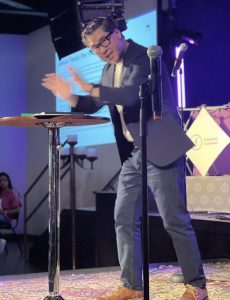
Eugene Cho (Photo by Starlette Thomas/Good Faith Media via Facebook)
Theology of advocacy
Speaking on hunger issues in the United States and the world, Eugene Cho, president of Bread for the World, said the organization advocates for a variety of national and even international hunger relief programs. That includes SNAP, WIC, the Farm Bill, Food Distribution Program on Indian Reservations, Justice for Black Farmers, the Food for Peace Act, and the Gus Schumacher Nutrition Incentive Program.
“The reason why this and so many of the programs we advocate for are so important is because 20 years ago, all the obsession was around the caloric intake, and we now realize it shouldn’t just be caloric intake, but nutrition and health should also be a priority here and abroad,” he explained.
Another program Bread for the World is working on is the Food Date Labeling Act.
“Why? Because in our country, approximately 30% to 35% of the food we create, produce, is thrown away. Just imagine that right now,” he said.
Cho said the food and nutrition issues addressed by these policies make a theology of advocacy critical.
“We are living in one of the worst global food crises in the last 50 years. Some reporting is that approximately 740-plus million neighbors globally created in the image of God face food insecurity, including approximately 45 million people experiencing something called ‘wasting,’ where their body literally is wasting and they’re at the most vulnerable state of human life because of a lack of food and nutrition,” he said. “And here’s, I think, the most difficult part of the story: There’s enough food in the world. And I know this is hard and sobering, but as you know, part of justice work is truth-telling. It may not always be the best topic for Sunday fellowship or for Friday night parties, but part of justice work is the commitment to truth. So as hard as it might be, we have to tell the truth that approximately every 11 or 12 seconds, a child, because of the complexities of hunger and malnutrition, perishes. And that’s why it matters.”
Cho outlined five aspects of a theology of advocacy that can pave the way to providing practical help and creating meaningful solutions.
“One of the most important things about a theology of advocacy is that you understand the importance of the whole person,” he said. “We need a theology of the whole person and therefore we need to understand a theology of the whole gospel.”
That whole gospel reveals Jesus not only is interested in our individual souls but in our collective well-being, he said. “Our cities matter, our nations matter, the world matters, justice matters, the environment matters, reconciliation matters, the poor and the oppressed, the hungry matter to God. Refugees fleeing from harm matter to God. Black and brown neighbors matter, migrant lives, children separated from their parents at borders and detention centers matter to God. The refugees in Syria, the Rohingya, the Sudanese matter to God.”
He continued: “So here’s my question, particularly to the capital C church that doesn’t believe compassion and justice are critical to our Christian identity: What happened in the church that we extracted justice out of God’s character and called it an agenda? … Justice is not a conference. And I know we know this, right? But it’s not a conference, it’s not an accessory you wear when it’s fashionable. It’s not an elective. It is central to our identity as followers of God.”
“What happened in the church that we extracted justice out of God’s character and called it an agenda?”
Cho said a theology of advocacy is rooted in love that makes room for all at the table. He pointed to Jesus’ feeding of the 5,000, which, with the inclusion of women and children who had no agency in that culture, was actually as many as 12,000 people.
“You can look with your own eyes and begin to realize that our world is somewhat tilted. It feels imbalanced,” he said. “Whether it’s citing the fact that during the height of the pandemic, 40% of our Black and brown neighbors in this country had difficulties placing food on the table. Or that rural communities are often forgotten in the conversations that are deeply impacting neighbors of all racial backgrounds. Or that we’re living in a time where senior citizens are struggling with issues of hunger in the latter stages of their life.”
Cho said a theology of advocacy is rooted in a love that pursues the dignity of every single person, and often that gets lost in our unintentional posturing toward a savior complex or hero complex. As well, a theology of advocacy requires a love that builds relationships.
He said a survey was conducted in August 2014 after the death of Michael Brown to assess the “insular bubbles of community in our nation.” Among 100 friends, the average white person has 91 white friends, one Black, one Latino, one Asian, one mixed race and other races, and three friends of unknown race. The average Black person has 83 Black friends, eight white friends, two Latino friends and no Asians. He said Asians didn’t fare any better than white Americans in their lack of diversity.
“So herein lies the tension: You and I, the church included, our society, we’re trying to have some of the most intense, critical discussions of very important things, and we actually don’t know people,” he said.
Cho said a theology of advocacy also speaks up.
“I’m not suggesting that advocacy — advocating for and with — is like amplifying people’s voices, because the phrase ‘people don’t have a voice’ is actually erroneous and undignified,” he said. “If everybody has a voice, the problem is that not everyone is heard. So, part of what advocacy is, is using our voice — the platforms, the privilege, the space we have — and how we are speaking up on behalf, and better yet, how we amplify inviting others to that table. At the core essence, that’s what a theology of advocacy is. It’s a love that speaks up.”
Growing gardens and changing policy
In a workshop addressing hunger issues, Jeremy Everett, executive director of Baylor University’s Collaborative on Hunger and Poverty, said the organization’s mission is to cultivate scalable solutions to hunger.
“So what we’re looking for is what’s working to address hunger in McAllen, and in Lubbock, and in Dallas that we can take to Des Moines, Iowa, or we can take to Alaska,” he said. “We work really with a three-pronged approach.”
That includes doing research on public policy and practice to find proximity.
“We believe when your community’s working with people on a daily basis, with research, you’re better able to identify essentially where that good soil is so that all of your efforts are on seed cast on good soil that can produce scalable impact, so we can address hunger as a systemic issue,” he said. “We also operate with the assumption that no one organization or sector can underwrite (everything) themselves. It apparently requires the church to work alongside government agencies, nonprofit organizations, even industry, if we want to ultimately solve the problem.”
It often is one’s ZIP Code and not their genetic code that determines lifespan.
Danielle Ayers, pastor of justice at Friendship-West Baptist Church in Dallas, said her church is working to address food insecurity in South Dallas where research from the Williams Institute indicates it often is one’s ZIP Code and not their genetic code that determines lifespan.
“People who live south of downtown, their life expectancy is cut in half compared to those who live north, and they attribute that to an unhealthy and unbalanced diet,” she said.
Ayers said Friendship-West has committed to working on both practical solutions to hunger as well as trying to move policy to address the systemic issues at its root. On the practical side, the church’s Food Choice food pantry allows people in the community to shop with dignity in a grocery store setting.
“They come in, they get a bag they shop with, they have fresh produce, they also have non-perishable items we give out every month. But also, if you just come eat there every week, you can get a bag of groceries,” she said.
On the systemic side, they’ve worked with Pan-African, Orthodox and Ecumenical Faith Engagement at Bread for the World to address policy issues. And locally, they’ve started a community garden where church members can buy their produce instead of having to travel long distance to grocery stores. The result is helping more people by creating a food system.
Rick Burnette, who serves as field personnel with CBF Global Missions, told how he and his team are addressing food insecurity in the farmworker community of Immokalee, Fla., through Cultivate Abundance, a nonprofit he and his wife founded in 2017. The irony is a farm town that produces around 14 million pounds of food every day during season is also a food desert, but now they are addressing that irony with a network of community gardens that helps workers provide for their families and each other.
“We are trying to get as many people locally in the skin of the game: small gardeners, church gardeners, nonprofits, smaller farms,” he said. “We think small is beautiful in this case. So we grow, we collect and we share.”
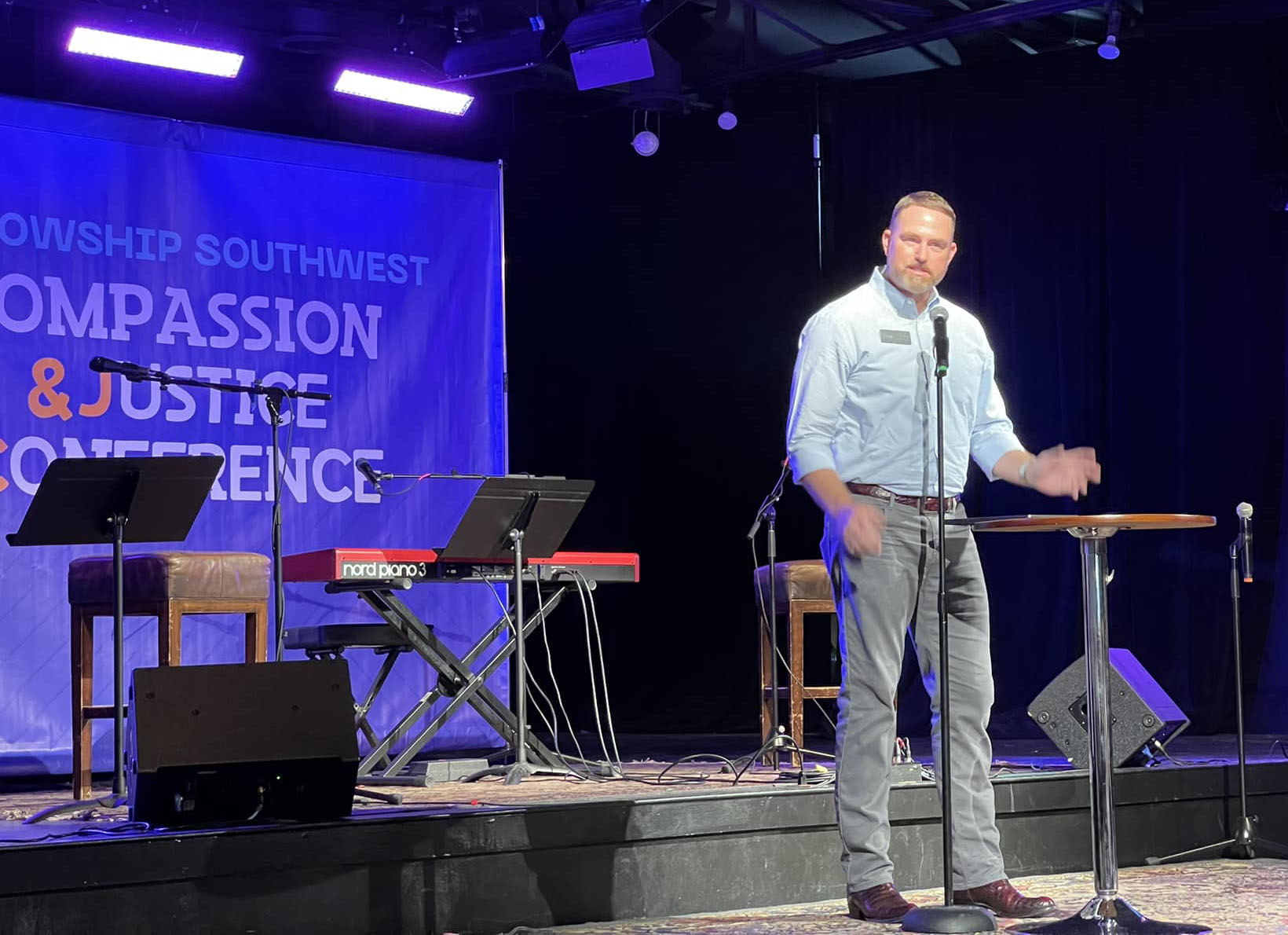
Stephen Reeves (Photo by Jonathan Davis/Fletcher Seminary via Facebook)
Planning the conference
Earlier in introducing the conference, Stephen Reeves, Fellowship Southwest’s executive director, said planning for this first conference began in 2019 around four topics identified as having a biblical basis for focus; opportunities for advocacy, direct service and ministry; opportunities to bring a wide spectrum of Christians together; and already having strong participation among faith groups.
He said a 2020 survey found a high percentage of individuals and churches from 81 congregations across the region representing nine congregational affiliations and multi-ethnic and cultural backgrounds already were involved in these areas.
“I’m convinced now more than ever that Christian advocacy is absolutely essential. It is also entirely insufficient,” Reeves said.
It is essential because Christian citizens living in a democracy have an obligation to work for the common good — to love and care for those who Jesus commanded them to love and those who too often are overlooked and ignored by the powerful,” he said. “But advocacy alone is not enough, It’s insufficient not just because policy moves so slow or our politics seem so hopelessly broken and divided, but because we’re encountering suffering, whether in our pews, our city street or at the border.”
“This is hard and messy work,” he said, “yet again and again we see Jesus in Scripture getting his hands dirty.”

